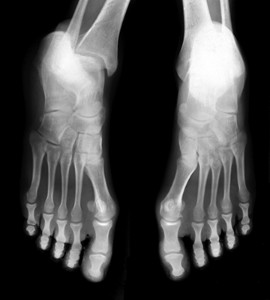Freehold (732) 294-9393
Freehold (732) 294-9393
 Researchers from South Korea have discovered a new method to predict if bunions will reemerge after surgery. The team utilized X-ray imaging and identified reemergence as a hallux valgus angle (HVA) of 20 degrees or more. Using this information, the team was able to predict the recurrence of bunions. Recurrence was more likely if the postoperative HVA was eight degrees or more. An HVA of 40 degrees or more also increased the likelihood of reemergence after surgery. The researchers are hopeful that more research will confirm the data, as this could help future surgeries and patients.
Researchers from South Korea have discovered a new method to predict if bunions will reemerge after surgery. The team utilized X-ray imaging and identified reemergence as a hallux valgus angle (HVA) of 20 degrees or more. Using this information, the team was able to predict the recurrence of bunions. Recurrence was more likely if the postoperative HVA was eight degrees or more. An HVA of 40 degrees or more also increased the likelihood of reemergence after surgery. The researchers are hopeful that more research will confirm the data, as this could help future surgeries and patients.
If you are suffering from bunions, contact Dr. Henry Miller of New Jersey. Our doctor can provide the care you need to keep you pain-free and on your feet.
What Is a Bunion?
A bunion is formed of swollen tissue or an enlargement of boney growth, usually located at the base joint of the toe that connects to the foot. The swelling occurs due to the bones in the big toe shifting inward, which impacts the other toes of the foot. This causes the area around the base of the big toe to become inflamed and painful.
Why Do Bunions Form?
Genetics – Susceptibility to bunions are often hereditary
Stress on the feet – Poorly fitted and uncomfortable footwear that places stress on feet, such as heels, can worsen existing bunions
How Are Bunions Diagnosed?
Doctors often perform two tests – blood tests and x-rays – when trying to diagnose bunions, especially in the early stages of development. Blood tests help determine if the foot pain is being caused by something else, such as arthritis, while x-rays provide a clear picture of your bone structure to your doctor.
How Are Bunions Treated?
If you have any questions, please feel free to contact our office located in Freehold, NJ . We offer the newest diagnostic and treatment technologies for all your foot care needs.